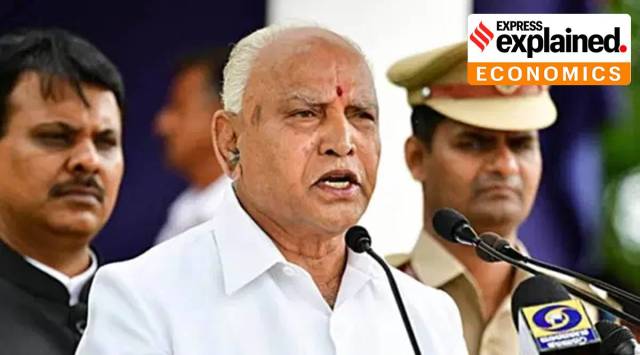- India
- International
Explained: Why Karnataka has decided to amend its 2002 fiscal law
The Act, which received the assent of the Karnataka Governor in August 2002, is intended to make the state government responsible for financial stability and sustainability.
 The objective is to tide over the financial crisis created by falling revenues and lack of GST compensation before and after the Covid-19 crisis.
The objective is to tide over the financial crisis created by falling revenues and lack of GST compensation before and after the Covid-19 crisis.In a cabinet meeting on September 15, the BJP government in Karnataka headed by Chief Minister B S Yediyurappa took a decision to amend the Karnataka Fiscal Responsibility Act, 2002 in order to allow the state to breach the annual fiscal deficit ceiling of three per cent of gross state domestic produce (GSDP) and increase it to five per cent to enable higher borrowings. The objective is to tide over the financial crisis created by falling revenues and lack of GST compensation before and after the Covid-19 crisis.
The proposed amendment to the Karnataka Fiscal Responsibility Act, 2002, which is scheduled to be carried out in the monsoon session of the state legislature that begins September 21, will be the third occasion since 2002 when the state has amended the fiscal responsibility law to allow for higher market borrowings to compensate for shortfall in funds for development work in the state.
What is the Karnataka Fiscal Responsibility Act, 2002?
The Act, which received the assent of the Karnataka Governor in August 2002, is intended to make the state government responsible for financial stability and sustainability, by setting and achieving annual and long-term targets for revenues, reduction of fiscal deficit and clarity in fiscal policies. The law imposes limits on borrowings, debt and deficits in order to facilitate creation of “social and physical infrastructure and human development”. One of the key financial policy demands on the state government under the law is “to take appropriate measures to eliminate revenue deficit and contain the fiscal deficit to 3 per cent of GSDP ”.
It also requires the state to present medium-term fiscal plans along with the annual budget with rolling targets for the fiscal indicators for four years.
Section 4 of the Karnataka Fiscal Responsibility Act 2002 outlines the fiscal management principles to be adhered to by the state government and Clause 3 (c) under this section says the state must “reduce fiscal deficit to not more than three per cent of the estimated gross state domestic product” and continue to do so in each of the financial years beginning April 1, 2002.

The BJP government in Karnataka intends to temporarily amend Section 4 of the KFRA in order to allow the state to increase its fiscal deficit target by two per cent to five per cent of GSDP to tide over the financial crisis caused by Covid 19 and shortfalls in GST compensation to the state from the Centre.
📣 Express Explained is now on Telegram. Click here to join our channel (@ieexplained) and stay updated with the latest
How much additional funds will be available to the state tinkering with the fiscal responsibility law?
The KFRA law is being amended by the BJP government after the Centre allowed the state to increase its fiscal deficit ceiling from three to five per cent to tide over the financial crisis in the fiscal year 2020-21. The increase in the fiscal deficit ceiling will allow the state to borrow a maximum of an additional Rs 36,000 crore in the current fiscal and the state has decided to avail of Rs 33,000 crore out of the eligible amount. The enhanced borrowing limit is available to the Karnataka government under its decision to opt for the first of two choices – offered by the Centre to make up for the lack of adequate GST compensation in the current fiscal. Under the option picked by the Karnataka government, the state will be eligible for a total GST compensation of Rs 18,289 crore with Rs 6,965 crore of this amount coming from collected GST cess and the remaining Rs 11,324 crore being available as a borrowing through a special window — with the entire burden of principal amount and interest repayment being met out of the GST compensation cess fund in the future.
Apart from the Rs 18,289 crore for GST compensation, the state has been allowed to borrow an additional one per cent of GSDP (Rs 18,036 crore) unconditionally, while another one per cent of borrowing is linked to carrying out reforms as suggested by the Government of India within timelines given as per a government order of May 17, 2020.
The Karnataka government has in the last few months carried out a few reforms to land and labour laws to be in a position to borrow funds. The additional borrowing is going to be utilised for development purposes, the government has stated.
Has KFRA 2002 been amended in the past?
In the aftermath of the economic crisis of 2008, the KFRA was amended on two occasions by the then BJP government in the state. In the fiscal year 2008-09, it was amended to increase the fiscal deficit target from three per cent of GSDP to 3.5 per cent to facilitate an economic stimulus package. The additional market borrowings availed under the relaxed fiscal deficit limits was used for undertaking capital expenditure during the year 2008-09. This target was further raised to four per cent of GSDP for the fiscal year 2009-10 through another amendment.
In the year 2010-11 the fiscal deficit target was re-calibrated at 3.44 per cent “as a part of counter-recessionary measures”. In 2011, the KFRA was also amended to allow the revenue and fiscal deficit to exceed limits set by the KFRA in the event of “unforeseen demands on the finances of the state government due to national security or natural calamity, subject to the condition that the excess beyond limits arising due to calamities does not exceed the actual fiscal cost that can be attributed to the calamities”.
What kind of revenue shortfall is Karnataka facing due to the current financial crisis?
In the state budget presented in March this year — ahead of the Covid 19 crisis – Karnataka CM Yediyurappa said the state was facing economic difficulties of a magnitude never faced in previous years. “Despite shortfall in allocation of grants and deficit in GST compensation, I am presenting this budget within the parameters of Karnataka Fiscal Responsibility Act, 2002,” he said. He listed a loss of Rs.35,160 crore due to floods, a slump in the state GSDP from 7.8 per cent in 2018-19 to 6.8 per cent in 2019-20, a reduction of Rs.8,887 crore in the state’s share of central taxes and a Rs 3,000 crore loss in GST compensation due to reduced collections as big worrying factors for state finances. “It has become difficult to reach the 2019-20 budget targets due to these reasons. To manage this situation within the bounds of the Karnataka Fiscal Responsibility Act, an inevitable situation has arisen this year to cut down the expenditure of many departments,” he said in the March budget speech.
According to opposition leader and former Karnataka CM Siddaramaiah, the state should get Rs 25,508 crore as GST compensation from the Centre in the current fiscal. “There is no way to determine the exact loss due to pandemic or recession or implementation. The GST Compensation Act mandates the Centre pay the gap to statues without any rider and the Narendra Modi govt should honor its commitment,” the Congress leader said.
Earlier this week, CM Yediyurappa travelled to Delhi to meet the PM and senior central leaders with requests for more financial assistance to the state.
More Explained
EXPRESS OPINION
Apr 26: Latest News
- 01
- 02
- 03
- 04
- 05










































